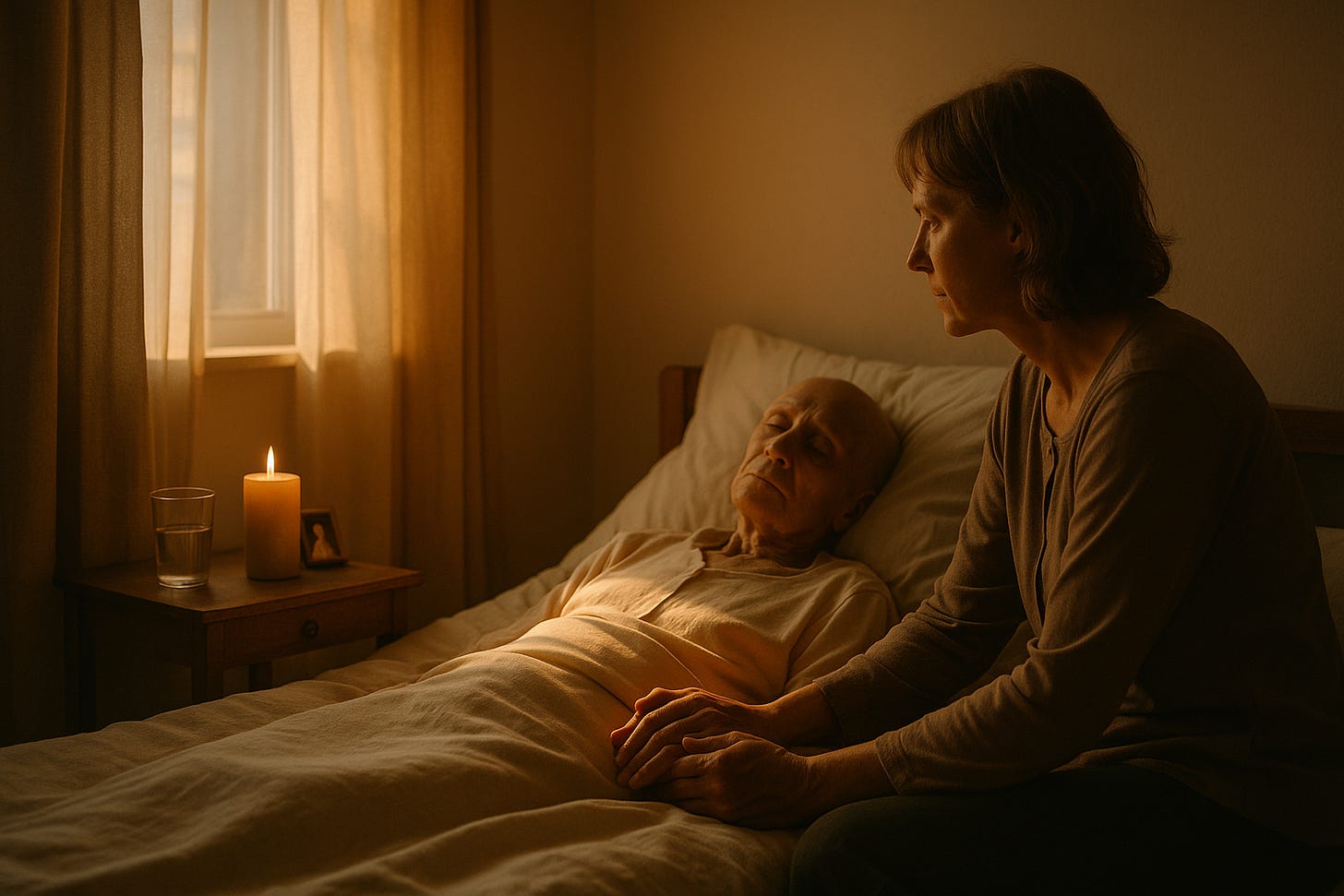How You Can Support Someone Who Is Dying
The sacred work of staying when there’s nothing left to fix
Here’s the truth:
Most of us are terrified of getting it wrong.
Saying the wrong thing.
Bringing the wrong energy.
Interrupting something holy.
Or worse, being helpless in the face of it all.
But the people I’ve sat beside, as the veil began to thin,
the ones whose skin had already started to cool
whose breath had slowed to that eerie, tidal rhythm
whose bodies were no longer interested in food,
or small talk, or our need to feel useful
None of them asked for eloquence.
None of them needed me to be impressive.
What they needed,
what they kept reaching for even when they couldn’t speak,
was presence.
Not advice.
Not the right words.
Not someone strong enough to carry it all.
Just someone still willing to be there
when everything else was falling away.
Stay. Even if you don’t know what to say.
Let’s start with what’s true:
You don’t need to fix anything.
You don’t need to cheer them up.
You don’t need to pretend it’s not happening.
You’re allowed to be heartbroken.
You’re allowed to be awkward and quiet and full of grief before they’re even gone.
You’re allowed to sit in that room with your whole nervous system screaming this is too much,
and choose to stay anyway.
Presence is not passive.
It’s not doing nothing.
It’s the active, sacred work of not leaving.
Not numbing.
Not bypassing.
Not rushing to cover it all in platitudes and prayer hands and light.
It’s the discipline of staying with what’s real.
Even if it breaks your heart open in the process.
Especially then.
What to Actually Do When You’re Sitting Beside Them
People always want practical steps.
So here they are, softened at the edges:
Ask what they want. If they can’t answer, listen harder. Some part of them will tell you, through the way their body responds, the way their shoulders soften when you speak, the way their eyes flutter when you hold silence.
Speak plainly. You don’t need poetic monologues. You can say: I love you. I’m here. I’m scared too. These are incantations, not sentences.
Let your touch speak. If touch is welcome, use it. A hand on the shoulder. A washcloth on the brow. Lotion rubbed into dry feet. Let your hands say what your mouth can’t.
Tend to the room. Lower the lights. Open a window. Turn off the TV unless they want it on. Add something that smells like who they are: jasmine, patchouli, cinnamon, old books.
Feed their body only if the body is asking. The dying don’t need you to push smoothies and soup. The body knows when it’s done eating.
Help the caregivers. They are unraveling slowly and often invisibly. Run a load of laundry. Hold space without needing thanks. Grief lives in the people keeping everything afloat, too.
If this is speaking to something deep in you—
if you’re walking through loss, sitting with someone you love,
or simply drawn to spaces where death and humanity touch—
I hope you’ll stay connected.
I write weekly at Bone & Bloom about the sacred, strange, and deeply human parts of being alive, dying, and everything in between.
Things We Get Wrong (And What to Try Instead)
Don’t assume they want to talk about dying.
Don’t assume they want to talk about living, either.
Let them steer. Follow with reverence, not rescue.
Don’t rush to say things like Everything happens for a reason.
Even if you believe it, it doesn’t always land.
Instead, try: This is hard. I’m here.
Or better yet, silence with a hand on theirs.
Don’t try to offer closure like it’s a checklist.
Some goodbyes are messy.
Some don’t happen.
Some come too late.
Some never come at all.
Let that be okay. Let that be human. Let that be something the soul still understands.
When the Grief Comes Early
Anticipatory grief is real and strange and brutal.
It creeps in before the body has stopped breathing.
You might feel it while brushing their hair.
Or folding their blanket.
Or hearing a song on the drive home and realizing that, someday very soon, you won’t be driving back there anymore.
You might cry in the shower and then make tea like nothing happened.
You might feel guilty for laughing.
You might resent their peacefulness, or their denial, or the way they’re already slipping from your world.
All of that is part of it.
Ritual, if You Want One
When words are too small, and you don’t know what else to do:
Light a candle.
Place one hand on your chest, the other on theirs (or above, or near, if touch isn’t right).
Breathe together for three slow inhales.
Whisper to the space between you: You are not alone.
That’s it.
You don’t need sage or crystals or perfect timing.
Just the willingness to witness without needing to control.
After They Go
The stillness afterward is disorienting.
Time gets weird.
The world keeps moving like nothing happened, but you’re floating in another dimension.
You might feel numb. Or relieved. Or gutted.
You might forget what day it is. Or smell them everywhere. Or find yourself whispering to their toothbrush.
If you can, sit with their body for a while.
Say goodbye in your own way.
Sing. Cry. Rage. Rock.
Love doesn’t leave cleanly, and you shouldn’t have to either.
If you’ve ever sat beside someone who was dying, you already know:
There are no gold stars for doing it right.
There’s only the ache of staying awake to it all.
The privilege of bearing witness.
The gravity of showing up when it would be easier to turn away.
And the quiet, unspoken knowing that being there,
truly being there,
was more than enough.
Love today,
Heather 🌸


